My Tribute to Ursula LeGuin, Who Wrote Some of the First Books I Cared About Reading
Author Ursula LeGuin died this week at age 88. Her books greatly influenced the young me. Here is my tribute.
In the 1960s, a writer named Ursula LeGuin stepped into the realm of fantasy and science fiction. It was squarely dominated by men at the time; for many years, she was one of the only major female authors. On the shelf of fantasy, Lord of the Rings and Narnia were the two major bookends. Both are terrific sagas, which have earned their places as pillars of humanity’s modern mythology, yet LeGuin ached for something that was more meaningful.
Lord of the Rings is a great series and I’m a fan. But it is fantasy fiction for geeky guys. There is hardly a single female character in the trilogy. The real life issues it addresses are some obvious ones: good vs. evil, friendships, teamwork, and believing in one’s self. Those all are important, but the end result is an epic journey that is not relevant for everyone.
Even as a young adult (whenever I first read it), C.S. Lewis’ Narnia series smacked of a Christian parable. It’s a great series as well and contains a diverse array of mythical beasts and some various human children who handle partly heroic and partly spectator duties. However, hindsight from the modern world show us that Narnia’s gender roles and its attitudes toward different races belong much more in the 1950s than today.
What if someone could tell stories without those limitations? If you've ever read or watched Game of Thrones, you'll know just what that looks like. Author George R.R. Martin credits Ursula LeGuin as one of his biggest influences and their stories have many similarities. Much of today's science fiction and fantasy both have major elements that began with LeGuin. She brought in real life issues and struggles that no one had seen before in these genres. And she encouraged other authors to set their imaginations completely free.
Limitless Possibilities
LeGuin recognized that fantasy and science fiction offered basically limitless possibilities for imaginative writers. Why should fantasy be confined to the world of medieval Europe, which so many authors adopt as their stage? Why should heroes in our worlds of imagination be limited to those who are white and male? Her books blasted through the stereotypes and helped open up these genres. They introduced real life issues, from environmental problems to child abuse to political governance, that had never been seen before in such a setting.
For example, one of her first science fiction works, The Left Hand of Darkness, won major awards by exploring a world inhabited by androgynous beings. She wrote it to experiment with a world where gender was taken out of the equation; what would it look like when a king gives birth? Game of Thrones author George Martin called it "one of the best science fiction novels ever written."
In others, she introduced strong female lead characters and placed people from different ethnic groups on the same footing, which have become staples of modern science fiction. In the decades since, many other writers and moviemakers took up her lead and used their imaginations to create better worlds, different worlds, and worlds where humanity has solved some problems and discovered others.
She was one of the first to put intelligent, real world themes in sci fi and fantasy fiction. With her Earthsea trilogy (to which she later added more books and short stories), LeGuin set out to write a fantasy series for everyone. What she created was not just a set of stories for young adults. It was literature.
Native Wisdom and Taoist Balance
Considering when they were written (mostly in the 1960s and 1970s), LeGuin’s books showed a high comfort levels with different cultures and influences. She must have been influenced heavily by her upbringing, since both of her parents were anthropologists. Her father, Alfred Kroeber, taught anthropology at the University of California, Berkeley, and was considered a pioneer in documenting the cultures and languages of Native American tribes, while also conducting archaeology projects in Peru. Her mother, who also earned an advanced degree in psychology and studied graduate level anthropology, wrote several noted works about Native American tribes and their legends.
In Ursula LeGuin’s books, she did not avoid the classic European Middle Ages backdrop that provides the widespread bag of tools for fantasy authors such as J.R.R. Tolkien. Her stories contained elements of that, but she introduced additional layers. Among them, you can see a grounding in indigenous cultures along with the Native American respect for the spirits of all living things. In her Hainish Cycle science fiction series, there are groups that strongly resemble Native American tribes. And most obviously, her Always Coming Home book drew heavily from works by both of her parents to create a fictional people in a post-apocalyptic world that might resemble a Native American tribe of the past.
The Earthsea books stand as her crowning achievement. The first three books, A Wizard of Earthsea, The Tombs of Atuan, and The Farthest Shore, tell three complementary stories that are vivid with symbolism. There is a hero or heroine for everyone in one of these stories, especially for older children or young adults who are struggling to define an identity and find a place in the world. LeGuin’s Taoist beliefs are evident throughout (she also wrote a book about the Tao Te Ching). At the heart of the Earthsea world is balance and it is held in place by magic. Each player has a counterpart, each action has a consequence, and mirror images figure prominently.
Never Given a Good Movie, But Popular and Influential
Ursula LeGuin was a popular author and she had a wide following that spanned generations. However, she never had the grand cultural tribute she deserved having her signature series made into movies. She granted rights to her work to both the SyFy channel (for a mini series) and to Studio Ghibli (for an anime version). Both came out very differently and bore little resemblance to the Earthsea books, which disappointed her deeply. BBC Radio created a stylish radio production.
In truth, I think it would be much harder to make a good movie of these stories than it was for Lord of the Rings, Harry Potter, and other book series. Nevertheless, I hope a talented filmmaker takes on that challenge someday. LeGuin did not live to see it happen, but it would be a tremendous benefit to society to have these stories accessible in another form.
Game of Thrones author George R.R. Martin has spared no praise. He listed LeGuin’s Earthsea books as among his greatest influences “without whom A Song of Ice and Fire would never have been written.” Dragons in the human realm, abused girls finding their way, and young people forced to take on the burdens of responsibility at an early age: sound familiar? These themes are prevalent in both LeGuin’s and Martin’s work.
Novelist Terry Pratchett identified Ursula LeGuin as “one of the architects of the consensus fantasy universe.” Handmaid’s Tale author Margaret Atwood described her as “one of the classic Twentieth Century writers.” There was a school of wizardry in Earthsea long before J.K. Rowling conceived of Harry Potter’s Hogwarts. In 2016, the Library of America organization announced that it would publish a volume of Ursula LeGuin’s collected works, an honor which was almost unprecedented for a living author (since this organization is a steward of major works from the titans of American literature, including William Faulkner, Louisa May Alcott, Nathaniel Hawthorne).
As a young adult, the Earthsea trilogy was one of the first sets of books that drew me in. In the years since, I have returned several times to the Earthsea books and their rich mythology (which now includes several more books and short stories that LeGuin has added to them over the years). Their symbolism, their struggles, and their lessons are as relevant today as ever.
As author Neil Gaiman wrote upon learning of her death, Ursula LeGuin was “the deepest and smartest of writers.” A fan responded on Twitter that she had never read LeGuin and asked which book she should start with. Gaiman replied “Anywhere. She was that good.”
https://en.wikipedia.org/wiki/Alfred_L._Kroeber
https://en.wikipedia.org/wiki/Ursula_K._Le_Guin
https://en.wikipedia.org/wiki/The_Left_Hand_of_Darkness
http://grrm.livejournal.com/316785.html
https://grrm.livejournal.com/561669.html
http://www.bbc.co.uk/programmes/articles/NvYCd6pbQ0wCvvY1PFZdtX/ursula-le-guin
http://www.oregonlive.com/books/index.ssf/2018/01/ursula_k_le_guins_legacy.html
https://twitter.com/neilhimself/status/955930053426274305
Top photo credit: Artwork for Earthsea from Simon & Schuster.
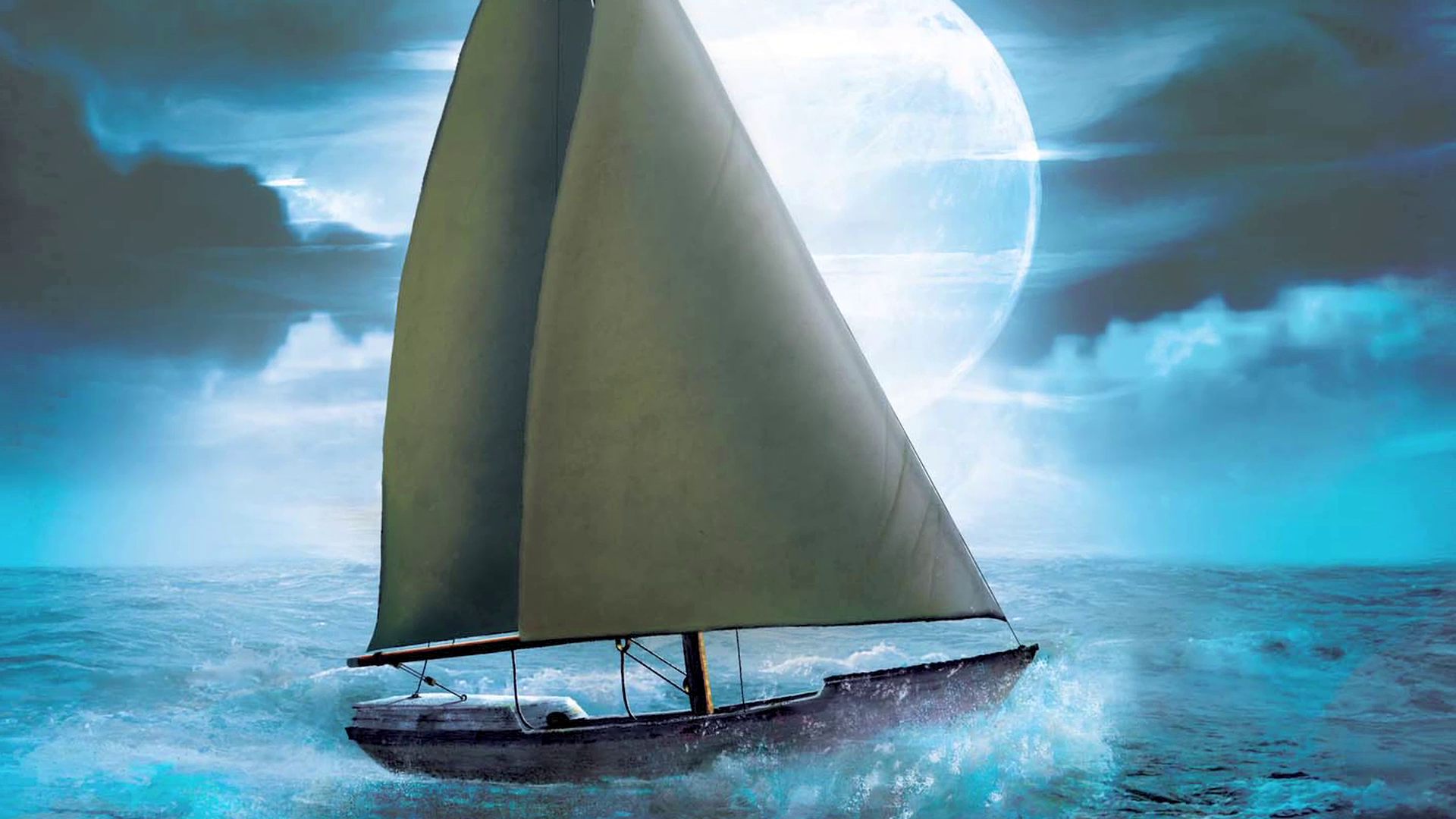
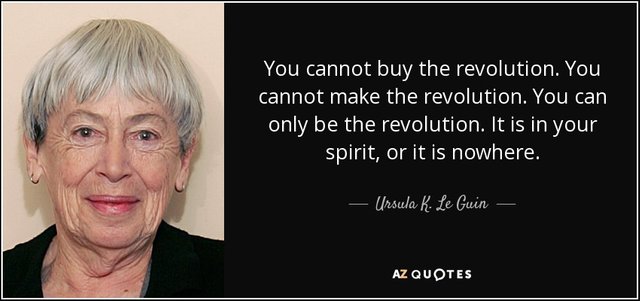
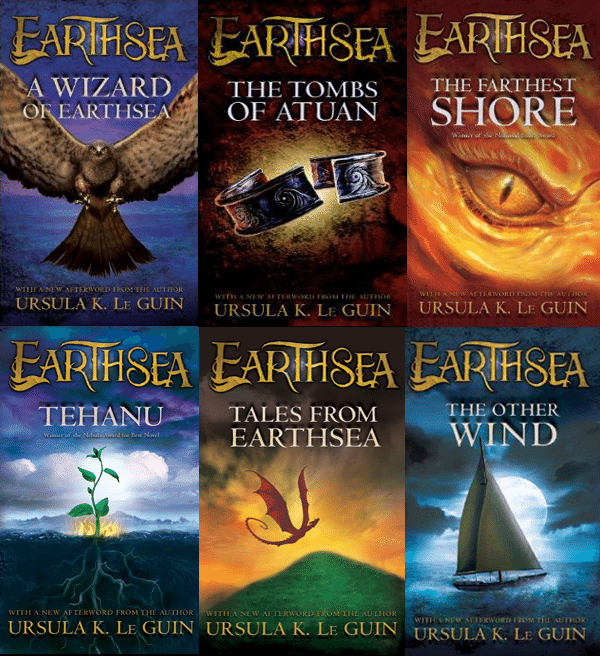
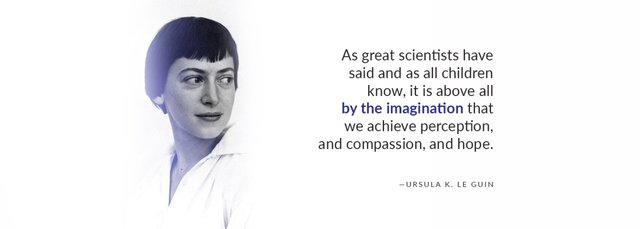
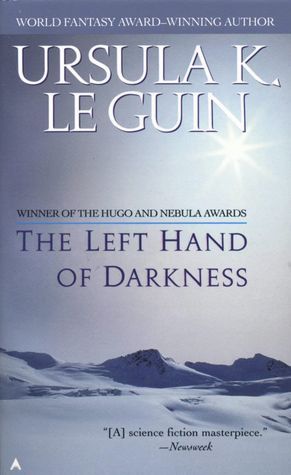
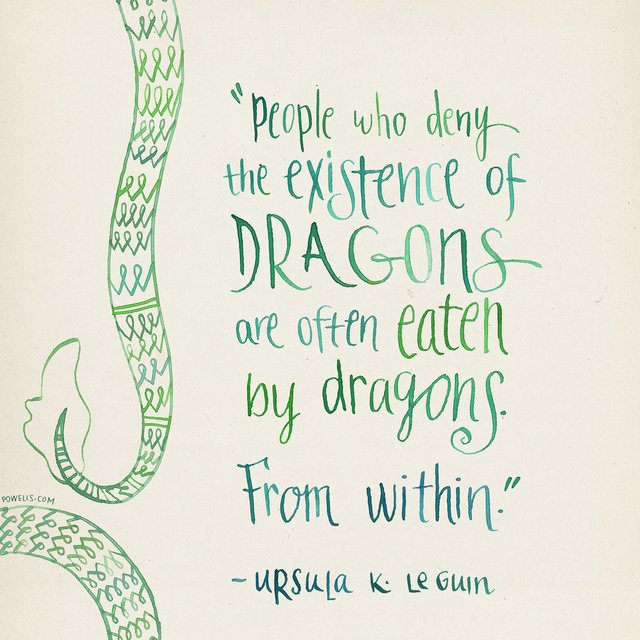
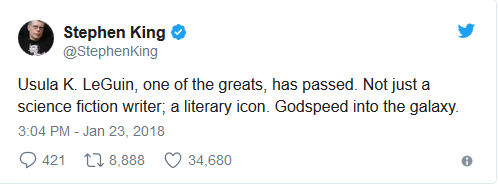
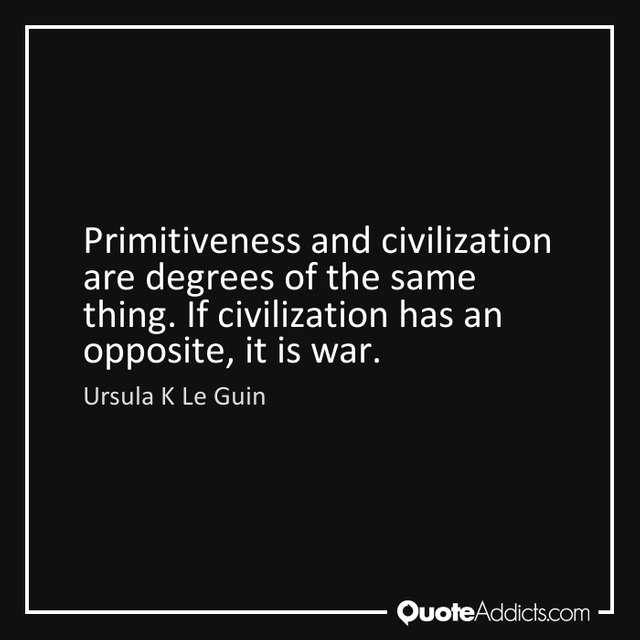
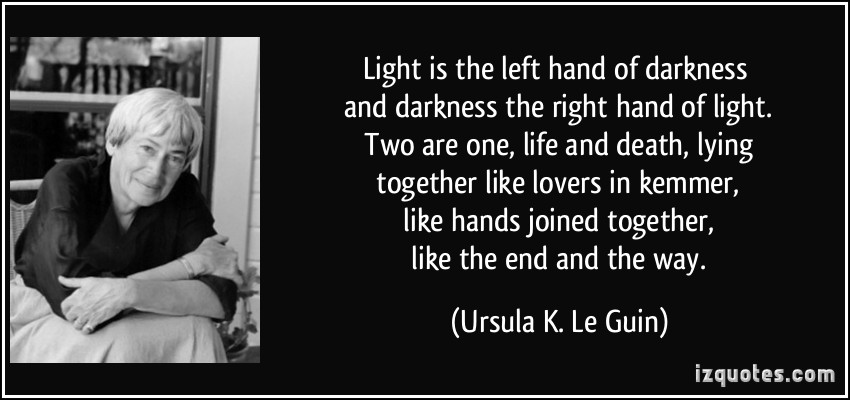
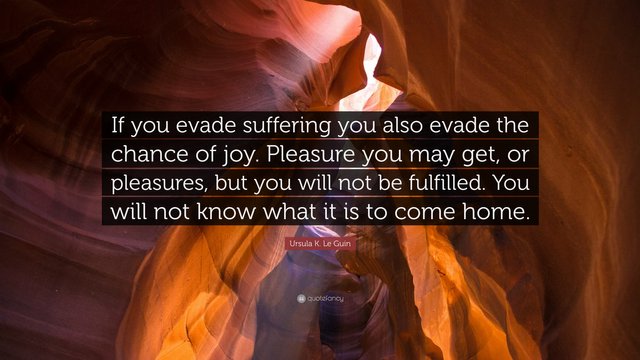
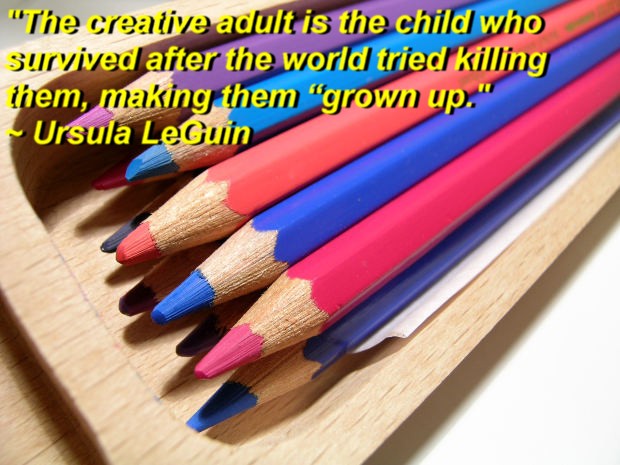
SHe was an amazing author!
Yes she was, amazing
Excellent tribute @donkeypong. She was without a doubt a great author. Though I liked all of her quotes but this one is special:

Steem On!
Another concise gem!
Agreed. She was a blessed lady.
It's interesting how I found such a great writer only after their death... Was it lack of curiosity or unavoidable destiny? I think the first one sounds more likely...
Wow. Awesome tribute. This is great. I really loved her and still do.
My favourite book with Le Guin’s name on it is her translation of the Tao Te Ching.
It don’t take to new things easily, so when i first read her translation is rubbed me wrong, it wasn’t what I was used to, what I expected.
But I kept coming back to it, and eventually became my favorite translation.Another favourite book by her is the Dispossessed. This is kind of a cop out answer because I’ve only read two books she authored, The Dispossessed and Left Hand of Darkness (which I had to return to the library before finishing so…). And frankly, I really don’t like Genly Ai (which has a lot to do with why I didn’t finish the book before the due date. I w as fascinated by what seemed like some parallels between the beliefs of the Foretellers and the Tao, so I’ll probably go back and finish it one day.
I really would miss her. To you my Le Guin you will be missed
more than you will ever know.
The Dispossessed is very good also. Yes, there are unlikable characters in some of her books, I agree. But groundbreaking and thought provoking they are, all of them. I never understood, until I was older, how much Taoism influenced her. The balance and the way were there in almost every book and in her words whenever she spoke.
Hmmmm. Taosim influences my life a lot even though I don't consider myself to practice it. Both of my best friends took up meditation at different times of their lives and they lead, though separately, lives of tranquility and quiet observation. Now I'm seeing signs of it everywhere, and every time I find a moment of crisis, I settle down and remember their teachings.
One of them also admires Buddha a lot and, funnily as it sounds, while I lead a life of pleasure-seeking, any time I'm alone and in a time-out, I imagine I've reached Nirvana and watch myself from above. I think this is also one of the pleasures of a writer, imagining yourself as a character and examining your own essence.
These very beautiful lines on death:

Then Tommy the tiny Steemian said "Stop sucking up to life and death. They only have power because you give it to them!"
And he died.
With the book of women dream dragons, we have realized how wonderful it is to find a lot of clues about herself, her books and world view, and dreaming. Science fiction / The greatest female writer of fantasy literature.
Science fiction / Fantastic is a philosophical novel about life behind the scenes at the same time.
in the terrestrial trinity (in fact a total of 4 books).
The sorcerer of the field = Birth
Atuan cemeteries = Sexuality
Furthest beach = Death
Theanu = The Resurrection, symbolizes.
The laughing diary and the left hand of the darkness are less well-known books that must be taken into consideration.
Some people can not keep Ursula's science fiction writing. For them, science fiction is made up of robots and machines. Ursula's scientific sciences do not go too far in his scientific direction. It tells the people and their change.
I agree with you. At the moment they are inspired by the most popular science fiction writers Ursala. Those writers are mentors. Inspirational. Eger can be sure if someone is watching a science fiction movie. There is also the effect of Ursula in that movie !!!!
Does a writer like him ever come back? I do not know. I know I will miss her and her fantasy world. @donkeypong
I love that she continues to interrogate fiction and society. That she is unafraid to admit error. That she doesn’t see it as a weakness but as a way to grow. I love her power.
I find myself unable to speak of her in the past tense. Today, I have been told that she is dead. There is a low wall between us, but not enough, I think to keep her from shaping my life or yours.
What a wonderful comment. No boundaries. Thank you!
Usually I don't care if someone copies something and I'm not someone who would flag. But this pisses me off, because these words clearly came from the heart of someone who loved her and knew her, and are being used here to earn money. So @lucyc if you're not http://maryrobinettekowal.com/journal/ursula-le-guin/
please refrain from further use of this comment, because I find it disguisting.
It so sad to see such an important figure for fantasy and literature go :-( You picked some amazing quotes to fill the post.... I've seen the syfy series and the anime they "adapted" from her work, but as you said, it doesn't really come close to the books, hopefully one day a good filmmaker be it animated or not will bring to life her work and create another piece to add to her beautiful legacy :-(
Wow, this is a great tribute @donkeypong, a well charted RIP tribute to the hero Ursula Kroeber Le Guin, a tremendous human being and storyteller who helped make fantasy a more imaginative and humane genre. Her loss is a huge loss, not only to the fiction society, but to the writing society at large.
This tribute is really concise and in point. No one would read this and not see the wonderful nature of this lady. Because of what you have written, I would make sure to study more about her, probably I'll get to be influenced by her even in her death, by her works.
I've been struggling with what you describe for a long-ish time in my readings. I love fantasy and science fiction. Those are my favorite genres and the ones I spend the most time reading. But after a while you get tired of reading the same thing over and over. Maybe the style is good, but it's as if it were just the rewritten wizards and dragons tale.
I'm a writer myself and I've been trying to explore these genres. I haven't read of Ursula LeGuin, but from what you're describing, I'm going to have to pick up one of her books and give her a long read.
Maybe these things are cliché nowadays, but she did it first. Today all science fiction and fantasy movies have tokenized their cast, filling it up with the overused proportion schema of
1 black : 1 asian : 1 white : 1 hispanicand I'm leaving out the ethnic representation of native Aboriginals because they're actually not portrayed as often.However, as I said, she did it first. Literature as a whole gives a step forward when authors like Ursula decide to change genres for good and take from the world as they see it and not as it is depicted by the mainstream context.
But it's important not to forget that what may be considered cliché is also something that might find a valid place inside your works. Maybe castles are overused. Why not put a spaceship on top of it? I'm exaggerating a little, but from what you describe about Ursula, she was a great supporter of moving forward our old pieces, not letting our genre and our style stagnate due to tradition and fidelity.
Thank you for the recommendation. I was about to ask that when I read that :P I'll go pick up one of her books. Thanks for the great post, @donkeypong, and for the inspiration. It will probably affect my writing style a lot now that I've read such constructive criticism.
Exactly. Always moving forward and adding things that we didn't expect to be there. The diverse casts today seem cliche and politically correct, but that's a good problem to have, and she deserves a lot of the credit for showing that everyone belongs.